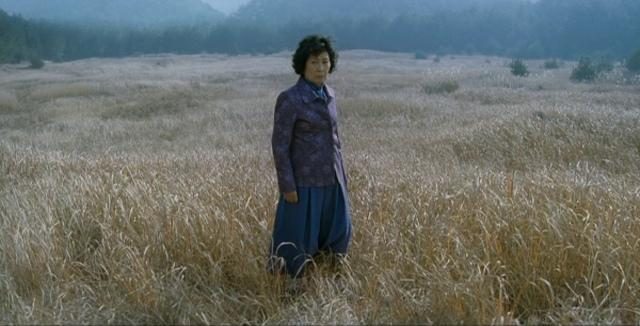Mother comes after Bong Joon-ho’s Memories of Murder, and it feels like the same plot turned inside-out: an excellent procedural reversed so its bloody, tragic insides are on the outside and it’s a drama. Memories of Murder contains a subplot where an intellectually disabled boy has a murder pinned on him, and Mother is what it feels like to desperately try to stop that from happening to your own son. The first is retrospective, covering years; the second is intense and immediate, and whatever clarity the characters get from their memories is often unwelcome, like the past is something that needs to be burned away to fuel the present.
The star here is Kim Hye-ja, who plays the titular–and otherwise unnamed–mother. Her resources are meager, and she’s barely scraping by selling herbs and offering off-the-books acupuncture to people who can’t afford anything better. Like the film itself, she builds herself around her role and the fierce, protective care she gives her only son, Yoon Do-joon (Won Bin). And when Do-joon is arrested for the murder of schoolgirl Moon Ah-jung, she devotes herself to getting him set free.
There’s a raw quality to her, and she has an expressive face that instantly shows everything she’s feeling–humiliation, sorrow, agony–and makes her a terrible liar. She’s not necessarily all that sharp–in a squirm-inducing moment where you feel her bone-deep embarrassment, she brings the police a “bloodstain” that they immediately recognize is really lipstick–but she doesn’t need to be. Sometimes a blunt instrument is all you need. She supplies force and persistence, and the case yields to her. The police, less interested and less dogged, can’t be bothered to do the same.
The course she follows leads her through squalor and depravity. She was living a life where she was poor but ordinary, living in a comprehensible world, and now she’s an outcast who’s finding out just how thin the veneer of normalcy really is. Her only real ally–and he’s a dubious one, self-serving and cruel–is the petty criminal she wanted to keep her son away from. He wasn’t a localized point of corruption after all; the danger was everywhere, within and without. (It’s even inside his own memories, once he unearths one particular childhood recollection while he’s in jail.) There’s almost a kind of Twin Peaks feel to some of it, like the movie is peeling back the upper layer of a community and showing you the dark soap opera going on just beneath the surface. Only this is less optimistic, and the only kind of mystic clarity and transcendence the characters can get is going to come at a steep price. And only because of their own choices, never just as a gift.
The film ends with a sense of breathlessness, an unprocessed knot of complicated emotions. It’s the experience of a participant, not an elevated observer, and the haunting quality that it loses is replaced–satisfyingly–with a visceral level of engagement.

